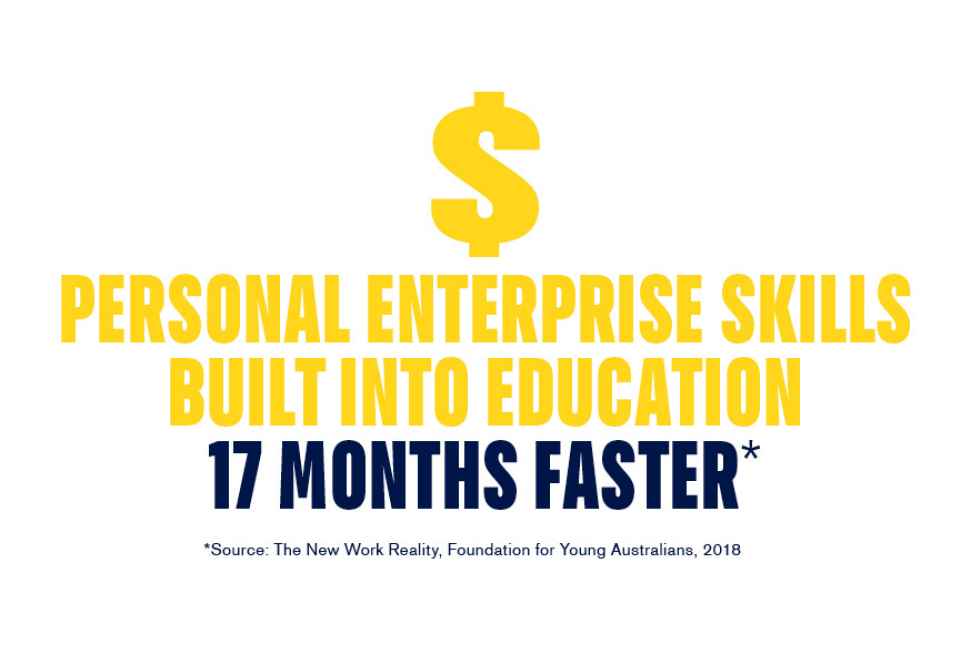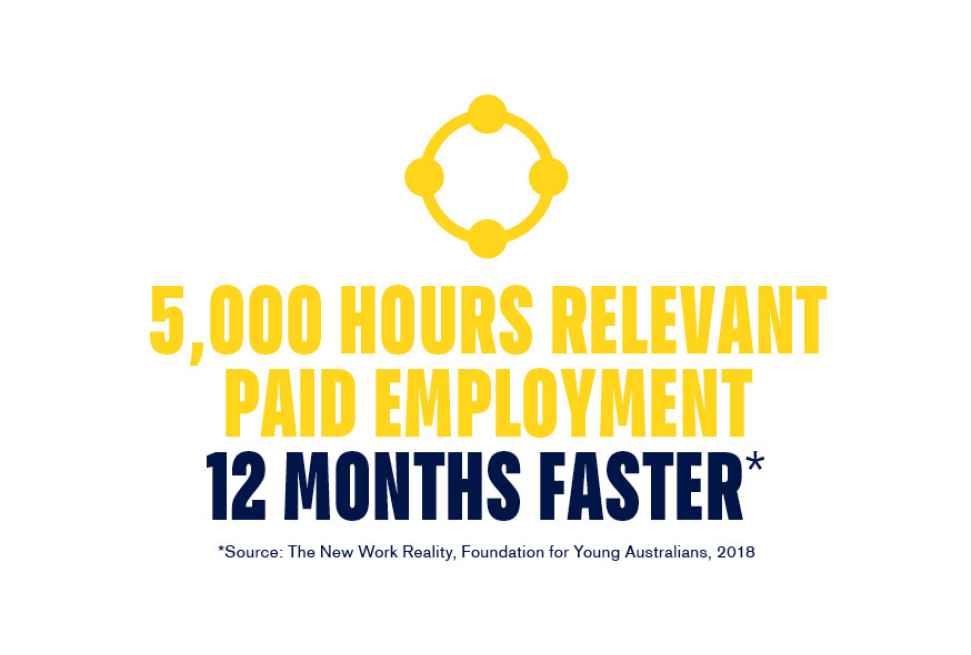Why study Innovation and Enterprise?
At Flinders we’re about building personal enterprise skills so you can thrive in the world of tomorrow. The world we know is changing faster than ever before and critical thinking and analysis skills are considered the number one skills needed by employers in the lead up to 2025*. That’s why innovation and enterprise skills and competencies are embedded across the university as core or elective topics. Find out how to include innovation into your undergraduate degree.
*World Economic Forum, The Future of Jobs 2020

Join us online all year round
Open Days 365 offers a range of ways to find out everything you need to know about study at Flinders.
First year topics
Being creative is about solving problems or approaching opportunities in novel and valuable ways.
This course is designed to help all students better harness their full creative potential-whether you think: “I am not creative” or “I already have more ideas than I can handle”, this class will help you come up with more creative ideas that offer more value and have greater impact on the world.
Although creativity has been studied by nearly every professional domain, this course focuses on creativity as a driver of organisational innovation-from non-profits to small businesses and large corporations to students’ own entrepreneurial startups, creativity and innovation is critical to providing value and ensuring long-term survival.
Throughout this course students will develop important life skills while learning to creatively solve problems through a number of real-world innovation challenges. No matter what career or profession you are going into, being more creative and appreciating how and why modern organisations function the way that they do will help you to be more valuable, more employable, more innovative, and more entrepreneurial.
Unbridled advances in technology and connectedness have transformed the relationship between companies, customers, and competitors. With this transformation, the lines between business relationships, social connections, and competitive advantage are converging and becoming increasingly intertwined. At the same time, there is a growing urgency to collaborate across boundaries to co-create solutions to the world’s increasingly complex, “wicked” problems.
As a result, companies across all industries and size classes-from established industry giants to high-growth companies in new technology areas-require the skills and knowledge to strategically harness the power of “the crowd” for collaborative and open innovation.
This highly experiential and challenge-led topic is designed to help students: understand how open innovation is used to create competitive advantage, improve society, and disrupt markets; develop the analytical ability to assess ambiguous, unstructured problems and provide solutions; apply practical tools for open innovation, crowdsourcing, collaboration and co-creation and crowdfunding and create new value by developing and implementing co-innovation initiatives.
Second year topics
It appears that a business oriented around a mission or purpose can create competitive advantage, as it encourages customers to want to purchase from them, employees to want to work for them and partners to want to collaborate with them.
Two cultures are at play in the field of social innovation: an age-old culture of charity, and a more contemporary culture of entrepreneurial problem solving.
Students explore how social entrepreneurs apply an entrepreneurial mindset of innovation, risk taking and large scale transformation to social problem solving with the potential to build social business models that generate rapid and sustained social impact.
Project driven, students will extend on their economic analysis of social innovation in practice, by applying practical (social media) interactive tools for story-telling, spreading the word and community building to the development and user-testing of their own social innovation.
The most effective innovators and entrepreneurs are those who can adapt their ideas to fit reality. This topic focuses on learning and applying a variety of hands-on tools for testing out the desirability, feasibility and viability of any idea.
Through readings, videos and a series of in-the-field exercises, students will test, refine, test again, and refine again a particular innovation. Along the way, students will learn a variety of skills and tools to understand and test users’ needs and perceptions, customers and funders’ willingness to pay and competitive dynamics and learn how to use these insights to validate a new innovation project or venture.
Third year topics
Whether interested in launching new ventures or transforming existing businesses, `From Innovation to Impact` develops students' capacity to go beyond “thinking big” to "making an impact".
This topic examines two key factors in moving innovations towards market and user adoption:
- an agile, "go-to-market" strategy
- a scalable, repeatable business model. Students will consider how market and industry landscapes and value chains impact routes to markets and go-to-market strategies.
Using the business model canvas methodology, students will learn to evaluate which business model best fits a particular opportunity and/or enterprise. Working on an existing opportunity, either the student's own or that of an organisation, students will explore the cutting-edge concepts, skills, know-how, attitudes and innovative alternatives relevant for designing a successful business model and go-to-market strategy for a new venture or early-stage innovation project.
There is constant debate about the value of ideas versus execution when it comes to successful innovation and entrepreneurship. On the one hand, ideas, are everywhere.
Few corporate innovation programs bemoan a lack of ideas and investors get pitched hundreds of new ideas per year by disruptive start-ups. On the other hand, only a small proportion of ideas are ever successfully launched in the marketplace and the statistics for innovation and start-up failure rates are eyewatering.
Great ideas need great execution but even great execution cannot make a success out of a bad idea. The reality is that new ventures need to combine great ideas with a relentless bias-to-action, a market-fitted strategy and the ability to assemble and mobilise the financial and human resources needed to launch and grow successfully.
This challenge-led topic develops students' capacity to “think creatively” and “act entrepreneurially”, whilst they practice bringing an opportunity to life, from ideation through to launch.

At Flinders, we prepare you for the careers of tomorrow, providing you with the ‘personal enterprise’ skills to be ready for the six different careers and 18 different jobs* you are likely to have over your lifetime.

NVI is the centre for innovation and entrepreneurship at Flinders University - considered to be one of the top five entrepreneurial educators in Australia*
Source: ‘Entrepreneurship at Flinders among best in Australia’.
How does Flinders accelerate your transition to work post university study?
We build personal enterprise skills, work integrated learning and health and wellbeing services into your university experience, which can accelerate your transition to full-time work between 2 and 17 months faster.*
What activities lead to faster entry to full-time work?



Australian Industrial Transformation Institute
You’ll be equipped with applied, relevant teaching practice informed by strong connections with government and industry through our internationally recognised research profile and Australian Industrial Transformation Institute.
The Australian Industrial Transformation Institute are leading the charge on industry and workplace innovation as we enter Industry 4.0, the fourth industrial revolution. We are researching the human and business impacts of technological change and building knowledge to inform strategy, policy and program development.
I am an
International Student
Australia or New Zealand.
I am a
Domestic Student
I'm an Australian Permanent Resident
(including Humanitarian Visa holders).
![]()
Sturt Rd, Bedford Park
South Australia 5042
South Australia | Northern Territory
Global | Online


